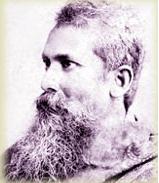Dwijendranath Tagore
| Dwijendranath Tagore | |
|---|---|

Dwijendranath_Tagore
|
|
| Born |
11 March 1840 Calcutta, Bengal, British India |
| Died | 26 January 1926 (aged 85) Santiniketan, Bengal, British India |
| Nationality | Indian |
| Spouse(s) | Sarbasundari Devi |
Dwijendranath Tagore (Bengali: দ্বিজেন্দ্রনাথ ঠাকুর) (11 March 1840 – 19 January 1926) was an Indian poet, song composer, philosopher, mathematician, and a pioneer in Bengali shorthand and musical notations.
The eldest son of Debendranath Tagore and grandson of Dwarkanath Tagore of the Jorasanko branch of the Tagore family, he was mainly educated at home, but later studied for some time in St. Paul's school and Hindu College of Calcutta (now Kolkata). He was always close to his next brother Satyendranath (1842–1923), but the two brothers differed considerably. While Dwijendranath was comfortable with traditions in society, Satyendranath enjoyed breaking down conservative rules and developing a modern society. A simple person he spent his time in cultivating poetry, acquiring knowledge and conducting various experiments. His wife died at a considerably young age and he remained a widower the rest of his life.
His first contribution to Bengali literature was the Bengali translation of Kalidasa's classical Sanskrit work Meghaduta in 1860, before Rabindranath Tagore (1861–1941), his younger brother and Nobel Prize–winning poet, was born. Dwijendranath was only twenty years old at that time. It was the first time that the great Sanskrit poetic work was translated into Bengali. He had used two different Bengali rhythmic styles for the translation.
His second great work of poetry was Swapnaprayan, published in 1875. Even when it was written Rabindranath was an adolescent. This poem describes the travels of a young man to different places. He had displayed a remarkable control over the use of different rhythmic styles in the book. The book is of historic value and was a trend-setter.
Michael Madhusudan Dutta was at the height of his success, when Dwijendranath started writing poetry. On return to Calcutta from Madras (now Chennai) in 1856, Michael Madhusudan worked with marvellous devotion for six years until he sailed for Europe, producing such plays and poems as Tilottama (1859), Padmavati (1860), Meghnadbadh Kavya (1861), Vrajangana (1861), Krishnakumari (1861), Virangana (1862), and so on, each scintillating with a new grace that raised 'Bengali literature to the highest pinnacle of glory' through brilliant successors such as Bankim Chandra Chatterjee and Rabindranath Tagore. It was an age when Michael Madhusudan influenced all Bengali poets but Dwijendranath was free from any such impact. On the other hand, Michael Madhusudan had hailed Dwijendranath as a poet of the future in whose honour he could dip his hat in respect.
...
Wikipedia
